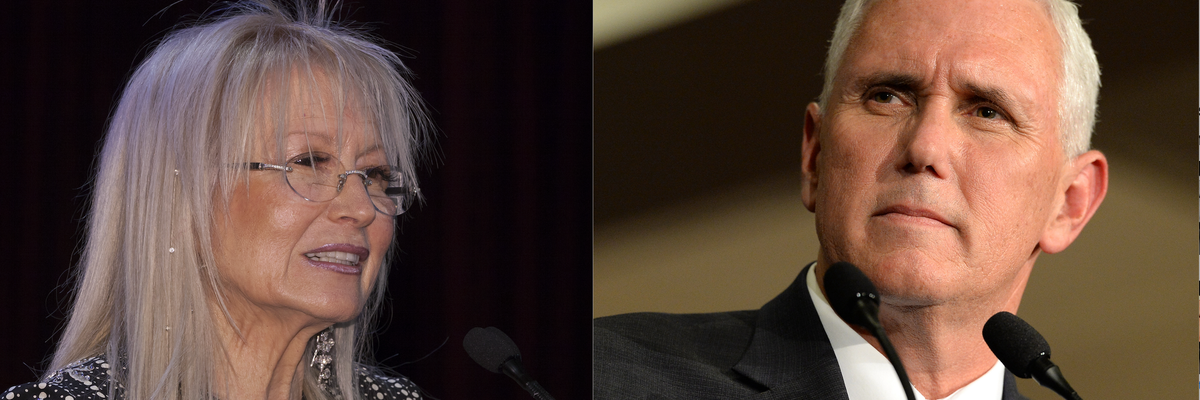Former Vice President Mike Pence appears to be courting the financial backing of the wealthiest Israeli, Miriam Adelson, who previously used her wealth to back the Republican Party’s support for abrogating from the Iran nuclear deal, moving the U.S. Embassy from Tel Aviv to Jerusalem, declaring the Golan Heights to be Israeli territory, “purged the sewer that was a so-called peace process,” according to Adelson, and pushed for former President Trump’s eventual clemency for convicted Israeli spy Jonathan Pollard, a move long opposed by the FBI, Naval Intelligence, and the Pentagon.
Pence reportedly flew to Israel on a private plane owned by the Adelsons, the same means of transportation the family provided to Pollard following his clemency, an immediate departure for Israel with a hero’s welcome on the tarmac in Tel Aviv.
But the connection between Miriam Adelson and her late husband Sheldon Adelson’s foreign policy motivations and their bankrolling of GOP candidates continues to be largely ignored or erased from reporting on Pence’s trip and Miriam’s reemergence, after her husband’s death, as the likely biggest Republican funder of the upcoming election cycles.
Yesterday, Axios reported that Pence traveled to Israel this week on one of the family’s planes. In a lengthy write-up, the online publication highlights that Miriam and her late husband Sheldon contributed nearly $220 million to Republican Party, emphasizing that “Pence broke news in the Israeli press by declaring the next Republican administration — which he predicted would take office in 2025 — would tear up any resurrected nuclear deal President Biden strikes with Iran.” Axios omitted the relevant information that opposing diplomatic efforts to constrain Iran’s nuclear program is a top agenda item for the Adelsons and other major GOP funders.
Jewish Insider reported that Miriam Adelson “upped her political involvement in recent months and intends to spend heavily in the forthcoming cycles” and quoted a Pence confidante conveying that the former vice president “paid his respects at Sheldon Adelson’s gravesite on the Mount of Olives.”
The Adelson-owned Israel Hayom scored an interview with Pence in Israel in which he argued that the Russian invasion of Ukraine made it “unconscionable that the American administration is at the same time negotiating at the side of the Russians to restart the Iranian nuclear deal.” The piece also described Pence as “known to be a strong supporter of Israel.” The paper did not disclose Miriam Adelson’s role in bringing Pence to Israel or that the paper’s owner was the top funder of Trump and Pence’s 2016 and 2020 campaigns.
And Haaretz highlighted that Pence threw his lot in with Israel’s far-right, “draw[ing] public attention after touring the West Bank city of Hebron with two of Israel’s most notorious right-wing extremists, MK Itamar Ben-Gvir and far-right activist Baruch Marzel” and mentioned Pence “dined with Republican megadonor Miriam Adelson.”
All except Israel Hayom made explicit mention of Miriam Adelson’s role in the trip and her status as a Republican megadonor, but none linked her explicit, and often extreme, foreign policy vision with the courtship undertaken by Trump’s former vice president.
Miriam, for her part, has never hidden her foreign policy motivations for engaging in U.S. politics as a dual-U.S.-Israeli citizen and her contempt for Jewish Americans who increasingly reject the far-right positions taken by former Israeli Prime Minister Benjamin Netanyahu and current Prime Minister Naftali Bennet.
“By rights, Trump should enjoy sweeping support among U.S. Jews, just as he does among Israelis,” wrote Adelson in a 2019 op-ed. “That this has not been the case (so far — the 2020 election still beckons) is an oddity that will long be pondered by historians. Scholars of the Bible will no doubt note the heroes, sages and prophets of antiquity who were similarly spurned by the very people they came to raise up.”
In an era in which money in politics is a core component of political news and coverage, the courtship of Miriam Adelson is a closely followed component of the political horse race, with pundits and journalists reporting on the outsized role she is likely to play in the 2022 and 2024 elections.
But unlike most reporting on money in politics that suggests a quid-pro-quo between megadonors and their recipients, the media, at least thus-far, continues to largely ignore the Adelsons’ actual influence and motivations for political engagement.
If one listens to Miriam Adelson, it’s clear what motivates her outsized political giving: pursuit of a hawkish U.S. foreign policy in lockstep with Israel’s far-right and largely in opposition to any Israeli concessions as part of a peace process with Palestinians and Republican opposition to any nuclear deal with Iran.
But news coverage of the Republican Party’s biggest donor is superficial, at best, and negligent journalism at worst.
Put another way, the “Five Ws” of journalism are “who,” what,” “when,” “where,” and “why.”
As the richest Israeli, with outspoken foreign policy views, stands ready to become the biggest standalone funder of one of the two U.S. political parties, journalists seem to be avoiding the question of “why?”
















